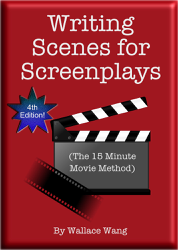What makes a great story? It’s not more action, A-list actors, or more realistic special effects. What makes a great story is watching a hero forced into making tough decisions.
That’s it.
Nobody will mistake a movie like “Legally Blonde” with an action movie like “Die Hard.” Yet both movies force their heroes to change. Watching the hero change is what makes each story meaningful. In general, heroes must change in three ways:
- End of Act I – The hero must choose to enter a new, unfamiliar world and leave their old world behind.
- End of Act IIa – The hero must re-commit to pursuing a goal.
- End of Act IIb – The hero must be determined to battle against the villain.
Decisions create meaningful action. Without knowing the motivation behind the hero’s decision, we won’t understand their actions.
In “Legally Blonde,” Elle, the hero, thinks her life is perfect because she believes her boyfriend is going to propose to her. Then her boyfriend dumps her instead. Now Elle is forced into making a decision. Will she let her boyfriend go? Or will she try to win him back?
That’s when Elle makes the decision to win him back and to do that, she’s determined to follow him into law school. That means she must also get into law school as well. Knowing her motivation makes her actions believable.
Now that Elle’s in law school, she tries to win back her boyfriend despite the fact that he’s now engaged to someone else. However, her next major decision occurs when her boyfriend tells Elle that she’s not smart enough for law school, even though she got in. That’s when Elle decides to prove him wrong so she studies hard and starts to excel in her classes until she’s invited by her law professor to apply for a position to help him with a real court case.
Elle’s third major decision involves flip flopping. After her law professor propositions her for sex, Elle is forced to realize people think of her as nothing but a blonde bimbo (which is the truth). Then she runs into a female law professor at the beauty parlor who convinces Elle not to let one jerk ruin her life. That’s the second half of Elle’s third major decision.
That’s when Elle charges into the court room as a new woman, embracing both her past and her new self as a lawyer.
Notice how these three major decisions shape the framework of the entire story?
- Elle decides to follow her boyfriend into law school, moving the story into an unfamiliar world.
- Elle decides to prove her boyfriend wrong by studying hard and excelling in her law classes.
- Elle nearly gives up when she realizes how people see her, but then she’s determined not to let it stop her from becoming her true self.
If you’re having trouble making up your story, start by focusing on the three major decisions your hero must make.
First, your hero must choose to enter a new world and get the story going.
Second, your hero must re-commit to her initial goal on her own.
Third, your hero must be determined to fight the villain and win.
Study your favorite movies and you’ll see how the hero must make three major decisions. It’s these decisions that make the story interesting because decisions lead to action that makes logical sense. The more we understand why the hero does what they’re doing the more emotionally engaged we’ll be with the story.
Sign up to take a FREE course about how to write scenes in a screenplay.

